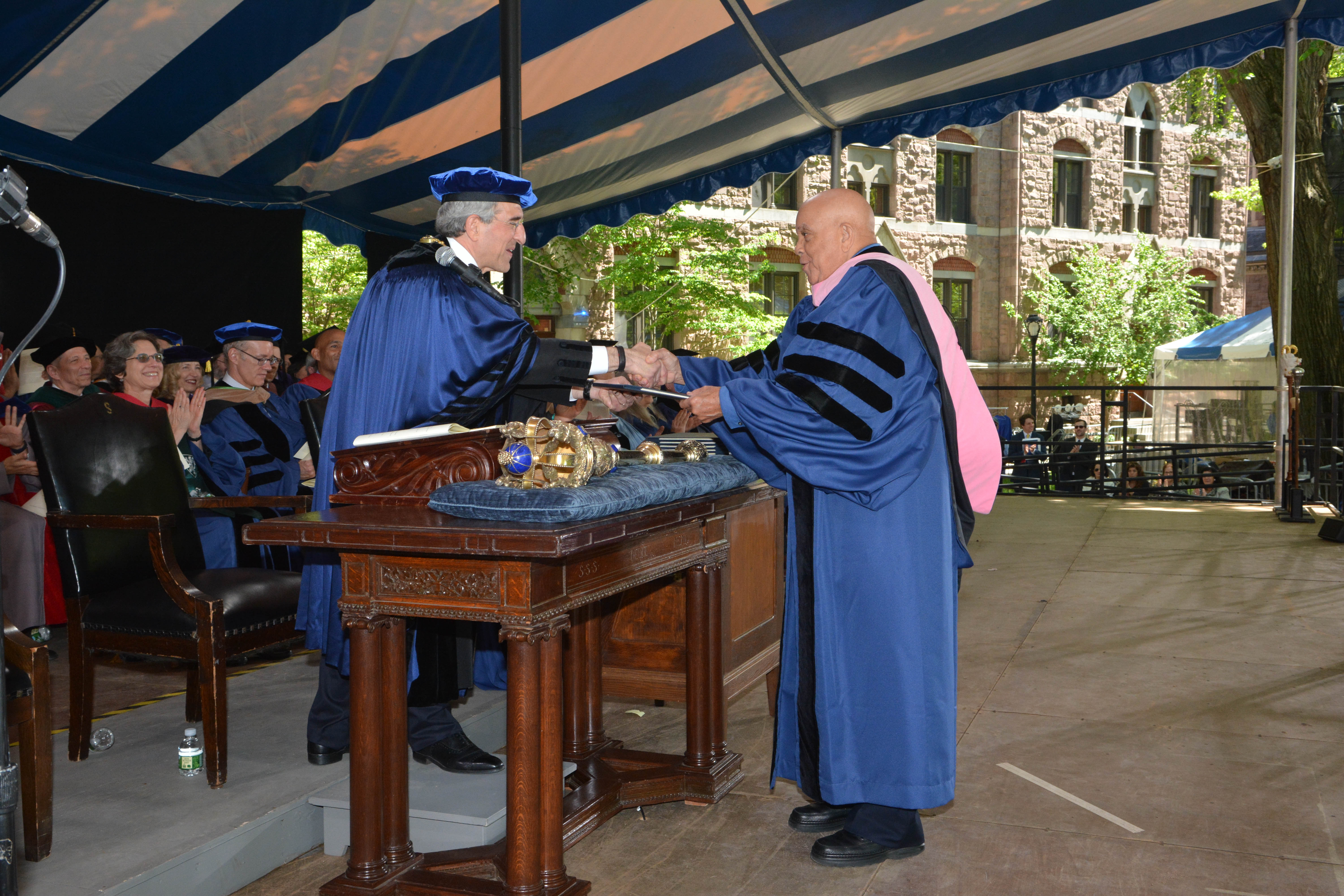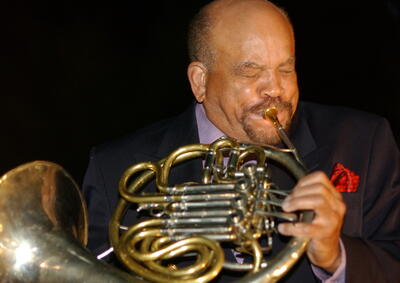Willie Ruff, legendary musician and scholar who studied and taught at Yale, dies at 92
Willie Ruff, an influential and erudite jazz musician and scholar who connected the Yale and New Haven communities to “America’s musical art form,” died on Dec. 24 in Killen, Alabama. He was 92. Ruff was Professor Emeritus of Music at the Yale School of Music, where he taught from 1971 until his retirement in 2017, and a School of Music alumnus, having earned his bachelor of music and master of music degrees in 1953 and 1954, respectively. Ruff also received an honorary doctorate from Yale University in 2018.
“In speaking to those who have been touched by Willie’s presence, I am moved to hear so many stories of the enthusiasm and knowledge he brought to any conversation and performance,” said José García-León, the Henry and Lucy Moses Dean of the Yale School of Music. “The depth of his intellect and humility was inspirational to many at the school. As musicians, I hope we all seek to embody his love of life and hunger for learning.”
Humble Beginnings
Born in 1931, Ruff grew up in Sheffield, Ala., and joined the Army at 14, forging his father’s signature on the necessary documents to enlist. It was in the service that Ruff, who’d started his musical life as a drummer and pianist, developed as a horn player and double bassist. It was also in the Army that Ruff met pianist Dwike Mitchell, with whom Ruff would later play in Lionel Hampton’s band before the two formed a duo and, over the course of five decades, brought jazz to new audiences around the world, including the Soviet Union in 1959 and China in 1981.
“He was an incredibly open, warm, and generous person and a brilliant player,” Jeffrey Brock ’92, Dean of the Yale School of Engineering & Applied Science and founding jazz bassist in the Vijay Iyer Trio said. “Part of what made him stand out to me was the way he expressed his personality through his playing. You could really connect the sounds he was making with the sense of humor and liveliness in the man. He and Dwike Mitchell defined a kind of communication and conversation in jazz that comes from a very intimate personal connection—listening to them was like listening to a spirited conversation between friends.”
It was at Lockbourne Air Force Base in Ohio that Ruff read an article in Down Beat in which pioneering saxophonist Charlie Parker said he’d love to study with composer Paul Hindemith at Yale. “If Yale was good enough for Charlie, it was good enough for me,” Ruff said in the Spring 2017 issue of the School of Music’s alumni magazine, Music at Yale.
A “Conservatory Without Walls”
Shortly after he joined the Yale School of Music as faculty, Ruff organized a momentous jazz convocation in Woolsey Hall that brought more than 40 of the art form’s luminaries—including Duke Ellington (on whom the university had bestowed an honorary doctorate in 1967), Marian Anderson, Dizzy Gillespie, Charles Mingus, and Mary Lou Williams—to New Haven to launch a program that Ruff called the “conservatory without walls,” the “invisible institution” through which African American musical traditions could be shared through performances, pedagogy, and interactions between artists and audiences at Yale, in the greater New Haven community, and beyond.
Credit: Irving S. Gilmore Music Library, Yale University Library
Ruff foregrounded jazz at Yale at a time when the genre itself was evolving in exciting ways. With the seminal 1972 event in Woolsey Hall, Ruff established the Duke Ellington Fellowship, a program at Yale that introduced thousands of schoolchildren in New Haven to performances by the most iconic jazz artists of our time. Between 1972 and 2002, the Duke Ellington Fellows had worked with an estimated 180,000 New Haven public school students.
For the indelible mark he left on the city, the Arts Council of Greater New Haven honored Ruff with its C. Newton Schenck III Award for lifetime achievement in and contribution to the arts in 2015.

“You have shared the wonders of music with the world,” Yale President Peter Salovey said upon bestowing the honorary doctorate on Ruff in 2018. “Introducing new audiences to the transcendent power of jazz,” Salovey said, “you discovered the echoes of distant times and faraway places in this quintessential American art form.”
“The extraordinary legacy of Willie Ruff is exemplified in his strength of character, love of learning, and compassion for all humanity,” former Yale School of Music Dean Robert Blocker said. “His life enriched us, and we are better because of his presence that surrounds us.” In 2013, Blocker also presented Ruff with the Sanford Medal – the School of Music’s highest honor – for contributions to the school and the field of music.
A Brilliant Thinker and Educator
Ruff’s teaching reputation reached far beyond the School of Music. “Speaking as a professor and dean,” Brock said, “I […] deeply admire the way Willie interacted with students and encouraged their creations. In a legendary course he taught (which, alas, I know only by reputation), every student had to write a composition that was orchestrated for the other students in the class. It was a remarkable way of drawing them out. Willie was extraordinary, and he helped make Yale extraordinary.”
Bill Purvis, Professor in the Practice of Horn at the Yale School of Music, often invited Ruff to guest-teach his classes and remembered Ruff to be at once brilliant and witty as well as relatable and deeply caring. “Willie radiated humanity and had a special gift for empowering the creative voice of each student when he would visit Horn Seminar, often in the most unexpected ways,” Purvis said. “I learned so much from him.”
Endlessly curious, having pursued a pre-med program in college and connections related to astronomy, computer science, and geology, Ruff also brought together more culturally diverse North American and international communities through his musical scholarship. His discovery of a musical connection between African American spirituals, Native American musical traditions, and Psalm singing in the Scottish Hebrides has been the subject of international conferences, the documentary film A Conjoining of Ancient Song, and features on National Public Radio. His memoir, A Call to Assembly: The Autobiography of a Musical Storyteller, earned Ruff the ASCAP Deems Taylor Award for Music Writing.
Credit: Michael Marsland
Ruff’s classes at Yale, like his remarkable stories, introduced students to such important musicians as Eubie Blake, Benny Carter, Miles Davis, Gillespie, Earl Hines, Ethel Waters, and others whose conversations with Ruff he donated to Yale’s Oral History of American Music project.
“I’ve admired Willie Ruff’s exceptional accomplishments as a scholar, educator, and jazz musician since my youth in New Haven,” said Wayne Escoffery, lecturer in jazz improvisation and director of jazz ensembles at Yale. “I cherish his legacy, am profoundly grateful for the trail he blazed, and I will continue to reflect on his vast accomplishments as a source of inspiration and guidance for myself, both as a musician and an educator.”
Ruff is survived by his brother, Nathaniel Pruitt, and several extended family members, including cousins, nieces, and nephews. He was predeceased by his daughter, Michelle, and former spouse, Emma Ruff.
This story will be updated with more information in the coming days.













